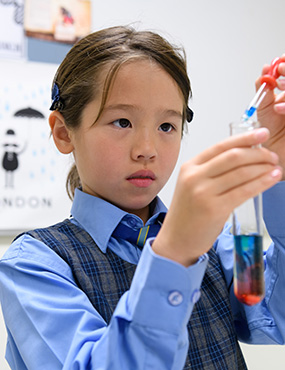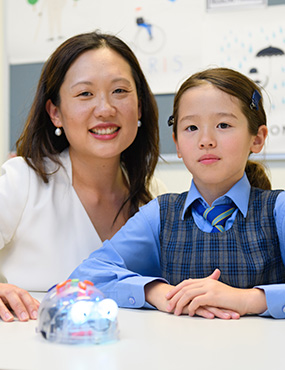Encouraging STEM uptake in young girls
Studies show that from as early as age one, girls receive less informal science, technology, engineering and math (STEM) education than boys.

Closing the gender gap in STEM learning
According to an economic study by Goldman Sachs, Australia’s gross domestic product would increase by 11% if the gender gap in STEM learning was closed.
To help address this problem, Macquarie University’s Pocket Rockets program has developed STEM workshops for girls between the ages of four and six, and their parents. The aim is to promote interest in the disciplines among girls who are just about to enter formal schooling.
“We want to encourage them in the belief that they can participate in maths, engineering, science and technology, and hopefully fuel a desire to participate in these studies throughout their scholastic life,” says Dr Carol Newall, the program’s chief investigator and a lecturer in the Department of Educational Studies.
While the University acknowledges the need to improve girls’ school readiness and engagement in STEM education, it also seeks to encourage parents to maintain their daughters’ enthusiasm and help develop their skills in both formal and informal educational settings.
At the workshops — which are open to all children but which have an emphasis on girls — participants experiment with robotics, program puzzles, construction and other exciting activities. Younger girls also benefit from a role-model program, where girls from Years 5 and 6 act as mentors during the workshops.
 The youngsters can then be inspired by older kids of the same gender, while the University can gather useful evidence about whether being a role model in the program leads to greater persistence and involvement in STEM education in later years at school.
The youngsters can then be inspired by older kids of the same gender, while the University can gather useful evidence about whether being a role model in the program leads to greater persistence and involvement in STEM education in later years at school.
The program has recently received generous support from the St George Foundation and Ian Potter Foundation, both of which recognise the importance of inspiring and supporting young girls.
Donations like these are critical for Pocket Rockets’ ongoing viability. All profits go to free workshops for disadvantaged children, as well as STEM-related research in early childhood.
In January 2017, the Imaginations Early Education centre in Goulburn took part in workshops held over two days. Without subsidised programs, institutions like this would be unable to regularly hold programs to improve and develop their students, and teachers, knowledge.
As part of their research, facilitators at the workshops administered surveys to those involved, with 100% of caregivers and parents reporting that the workshops helped develop their child’s interest in STEM. A substantial majority of the children (80.64%) reported feeling more excited about STEM after the workshops, and there was an increase in children’s aspirations to become ‘scientists’, rising from 58% before the workshops to 74% at the conclusion.
Staff at the centre also noticed that the high level of engagement between the child and teacher was fundamental to the children’s positive experiences. Teaching staff discovered that STEM learning is accessible for all, and that they could use their own experiences to really encourage children to be inquisitive, ask questions, experiment, take ownership and build self-worth.
The Pocket Rockets program and workshops are contributing to our understanding of STEM uptake in young children — particularly girls — and are creating the STEM leaders of tomorrow, says Newall.
“We hope to encourage their sense of leadership, belonging and identity in the field.”
Building 1, 58 Waterloo Road
Macquarie Park NSW 2113